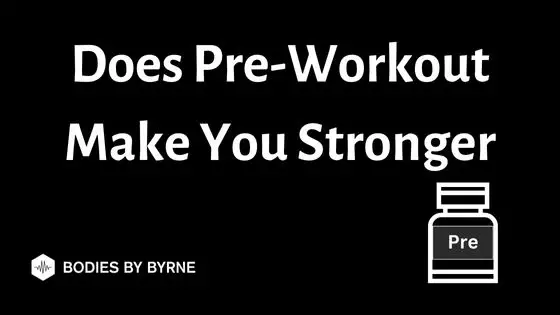If you’re at all familiar with gym culture, you’ll know that every year, more people are relying on pre-workout supplements to help them hit their fitness goals.
The promises most pre-workout supplements make are certainly impressive: Increased focus, the energy you need to push through the hardest workouts, and most importantly, increases in strength.
But do pre-workouts actually deliver on what they’re promising, and does pre-workout make you stronger?
Table of Contents
Does Pre-workout Make You Stronger?
There’s a simple answer to the question.
Yes, but not directly…
Taking a pre-workout should have a significant effect on both your ability and willingness to exercise, and the results of that exercise which means it could indirectly lead to progressions in strength.
Pre-workout supplements tend to make a lot of hyperbolic promises as part of their marketing.
But the individual effects that you might see depend a lot on the ingredients in the pre-workout formula, your fitness levels, and even how your body reacts to specific ingredients.
How Pre-workout Makes You Stronger: The Research
Every pre-workout supplement is going to have its own list of active ingredients.
It’s also common practice among supplement companies to hide some of their ingredient list behind a proprietary blend, which can make it almost impossible to see precisely what’s in each formula.
But most pre-workout supplements share several common ingredients, listed below in the order you’re most likely to see them.
Caffeine
Probably the most common component in most pre-workouts is caffeine, the same caffeine that you find in a cup of coffee.
Caffeine is a mild stimulant, and the effect it has on our nervous system, ability to focus, and overall energy levels is widely documented.
But there is also a growing body of research on the effects of caffeine when it comes to strength gains, and providing fuel to your muscles, including:
- Significant gains on 1 rep max
- Increased maximum reps and exercise volume
- and improved upper body strength and power
Supplementary research also suggests that taking a caffeine supplement 10 to 15 minutes before serious exercise could have effects on endurance and overall time to exhaustion.
Branch Chain Amino Acids
Branch chain amino acids (BCAAs) are 3 of the main, essential amino acids that are used in building muscle. Essential amino acids can’t be synthesized in your body, so have to be obtained through diet or supplementation.
BCAA supplementation primarily helps with muscle growth, endurance and recovery, but can also have a significant effect on short term strength and energy availability.
Taurine
Another amino acid, taurine is commonly found in sports drinks, energy drinks, and sports supplements.
Multiple studies on taurine show that supplementation before exercise could decrease levels of lactate in the muscles, and increase available glycerol levels, both of which heavily contribute to the ability to continue exercising.
Lactate in particular is responsible for lactic acid build up, and muscle failure from heavy exertion.
Creatine
Creatine is one of the most widely used exercise supplements, because of the wide range of benefits and literal decades of scientific research making it one of the most strongly supported
Studies show that regular use of creatine may:
- Improve overall strength, especially in short bursts of intense exercise
- Increase lean muscle mass and stimulate new muscle growth
- Boost ATP storage in your muscles, which provides more energy so you can exercise longer
- Help fight against the effects of fatigue
Pre-workouts with creatine tend to heavily emphasise it, so should be easy to find if you’re already supplementing with, or looking to start supplementing creatine.
What’s the Best Time to Drink a Pre-workout?
The active compounds in a pre-workout don’t do anything until they’ve been absorbed by your body and delivered into your bloodstream, so the timing of taking a pre-workout can be as important as what’s in it.
Most pre-workout supplements are designed to have a window of effectiveness that kicks in after around 15 minutes, and caffeine in particular will have the most effect for around 30 minutes after that time period.
That means for the most potent effect, a pre-workout should be taken around 15 minutes before exercise.
Can You Drink Coffee or an Energy Drink for the Same Benefits?
So, if the majority of the strength benefits of a pre-workout come from caffeine, is asking whether you could drink coffee or an energy drink instead a reasonable question?
This is something we’ve covered in much greater detail in the articles coffee vs pre-workout and pre-workout vs energy drinks. Two comparison articles look over the benefits and drawbacks of all three options.
While consuming a non-pre-workout that’s high in caffeine is going to see some benefits, if you have the option you should always choose a specifically designed sports supplement.
Not only is a pre-workout designed to boost physical performance, you’ll also be benefiting from a host of supplementary compounds on top of the caffeine, and avoiding consuming tons of sugar and pointless empty calories.
Bottom Line
It stands to reason that taking a pre-workout is going to make you stronger.
The literal purpose of pre-workout is to help you hit your goals. But as this article has demonstrated, it’s not as simple as dry scooping a cupful of powder and hitting new PRs every single session.
If you feel like you’re not getting the results you want out of your pre-workout, the first step is probably to try another supplement and see if that has a different effect.
But if you’re not already using a pre-workout, and you’re looking for a performance boost, pre-workouts are a quick and easy way to contribute to that.
